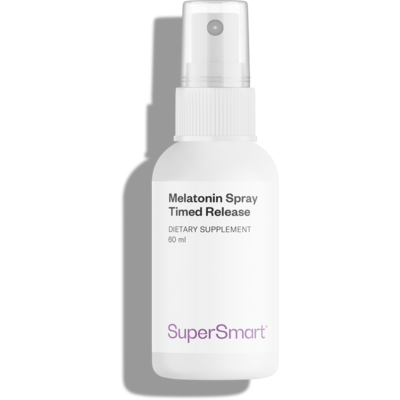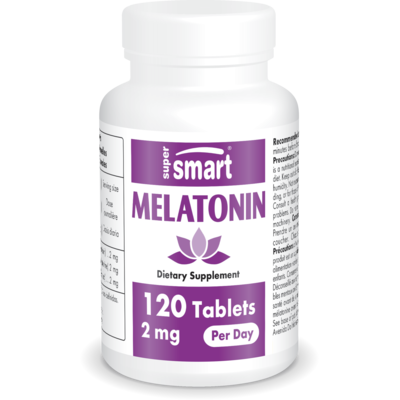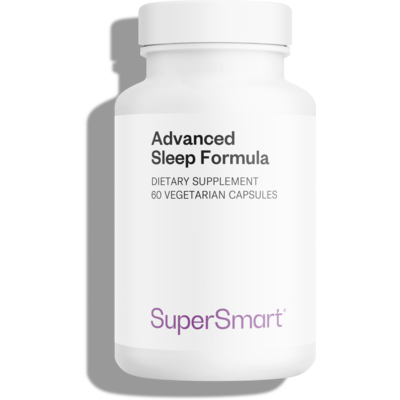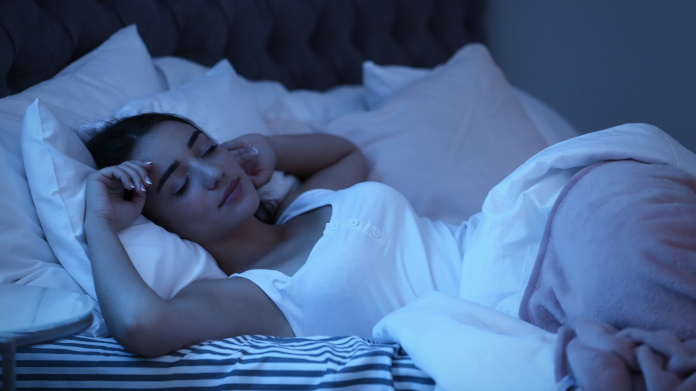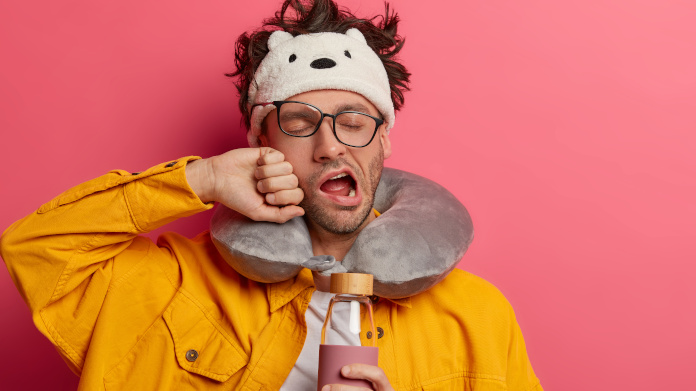Which is the best melatonin for helping you sleep?
Melatonin is a hormone naturally produced by our bodies to help us sleep. But which type of melatonin supplement should you choose?
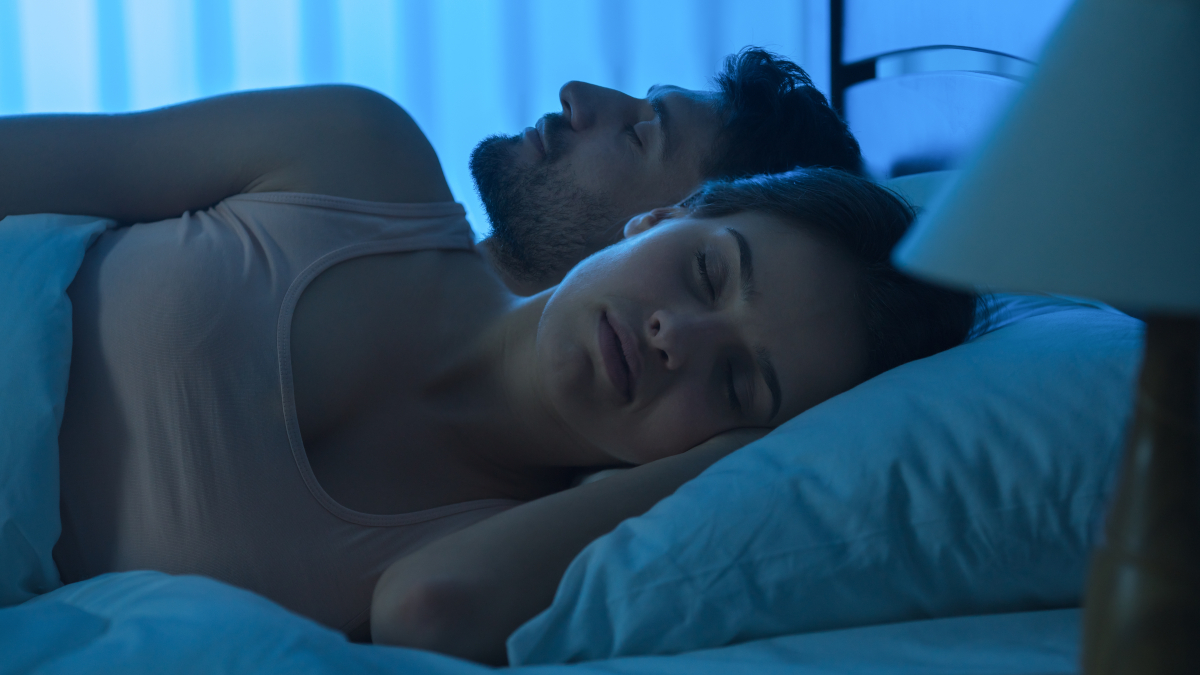
Everything you need to know about melatonin (the sleep hormone)
Before we get to which forms of melatonin are best, it’s important to understand where this hormone comes from and how it works.
What is melatonin?
Melatonin is a natural hormone derived from serotonin. It is primarily secreted in the evening and nighttime by a small cone-shaped endocrine gland called the pineal gland (or epiphysis), located near the center of the brain.
Melatonin plays an important role in synchronising various physiological processes such as regulation of body temperature, the immune system and sleep (1-2).
Link between melatonin and sleep
Melatonin manages the body’s circadian rhythm, its 24-hour internal clock.
As daylight fades and darkness takes over, the brain begins secreting melatonin (1). This produces a feeling of calm and drowsiness which gradually prepares the body and mind for sleep.
Melatonin secretion peaks between 2 and 4 in the morning, before gradually decreasing over the second half of the night.
Why might we need more melatonin?
There are several reasons why we might be lacking in melatonin.
The effect of blue light
Modern lifestyles mean regular screen exposure (smartphones, televisions, computers ...). All these devices emit artificial blue light which, at excessive levels, can disrupt melatonin production.
In normal circumstances, as daylight fades, the retina sends a signal to the brain to stimulate the production of melatonin. When we’re exposed to blue light, this secretion is delayed, and even reduced, making it harder to fall asleep, and resulting in morning drowsiness or insomnia.
Jetlag and night shift work
Long-haul travel that involves crossing several time zones, and night shift work, can disrupt the body’s internal clock.
The circadian rhythm gets out of sync, affecting the body’s natural melatonin production. People who work night shifts or irregular hours may then find it difficult to fall asleep.
Lifestyle and aging
Lack of physical activity or excessive consumption of alcohol and caffeine can also disrupt normal regulation of this sleep hormone.
Age, too, can affect natural melatonin production, due mainly to gradual calcification of the pineal gland (2-3).
How can you increase your melatonin levels?
If you suffer with sleep problems, adopting these specific lifestyle habits may help:
- avoid excessive exposure to blue light from screens;
- practise relaxation techniques before going to bed;
- maintain an environment conducive to sleep;
- establish a regular bedtime routine.
You can also take dietary supplements to increase your intake of melatonin. Melatonin supplements are recognized for helping to cut the time it takes to fall asleep and reduce the subjective effects of jetlag.
What are the various forms of melatonin available?
Below are the different types of supplements you can buy to increase your melatonin levels.
Guaranteed efficacy: melatonin tablets dosed at 2mg a day
Some melatonin supplements (such as Melatonin 1mg) contain 1 mg of melatonin per tablet.
With a recommended dose of 2 tablets a day, they enable you to benefit from a daily intake of 2 mg of melatonin, a dose that’s very effective and usually sufficient to promote drowsiness (4).
You can take them for a few days or weeks to get your sleep ‘back on track’ before moving to more occasional use, as required.
Melatonin sprays, for more rapid effects
Melatonin supplements are also available in the form of sprays which are administered sublingually.
This is a highly effective method as it allows the active ingredients to enter the bloodstream more quickly, thus bypassing the digestive process (try, for example, Melatonin Spray).
Synergistic melatonin formulations
There are also supplements in which melatonin is combined with various other ingredients to provide a synergistic action.
One example is CBD, the well-known active ingredient in cannabis (see the product CBD+Melatonin).
In other supplements, melatonin is combined with sleep-promoting vitamins as well as sedative and relaxing plants like valerian and passiflora (try, for example, the product Advanced Sleep Formula or sugar-free Sleep Gummies).
Supplements in which melatonin is combined with relaxing plant extracts are ideal, not only for promoting drowsiness but for making sure you stay asleep throughout the night thus providing the restorative benefits of a really good night’s sleep.
SuperSmart ADVICE
References
- Melatonin: Pharmacology, Functions and Therapeutic Benefits. Sylvie Tordjman, Sylvie Chokron, Richard Delorme, Annaëlle Charrier, Eric Bellissant, Nemat Jaafari, Claire Fougerou. 2017
- Age-Related Decreases in Melatonin Secretion—Clinical Consequences. Richard J. Wurtman. The Journal of Clinical Endocrinology & Metabolism, Volume 85, Issue 6, 1 June 2000, 2135–2136. 2000
- The human pineal gland and melatonin in aging and Alzheimer's disease. Ying-Hui Wu, Dick F. Swaab. 2004
- Costello RB, Lentino CV, Boyd CC, O'Connell ML, Crawford CC, Sprengel ML, Deuster PA. The effectiveness of melatonin for promoting healthy sleep: a rapid evidence assessment of the literature. Nutr J. 2014 Nov 7;13:106. doi: 10.1186/1475-2891-13-106. PMID: 25380732; PMCID: PMC4273450.
Keywords
1 Days
Quick shipping
Quick shipping; good price. No issues!
Mary McCarty
3 Days
Thr product is very good and is helping…
Thr product is very good and is helping me on my health. Then is always on time
LUGO Luz
5 Days
Buying was fine
Buying was fine. I had problems with the website not recognizing my login info, and had to call to get it fixed. Other than that, everything was good.
David S. Clark
5 Days
Your super maca and super ginseng are…phenomenal
Your super maca and super ginseng are phenomenal supplements that compliment each other when taking them together. Fantastic feeling of well-being and lots of mid day energy without the crash.
Keith Mason
8 Days
I have had amazing results with every…
I have had amazing results with every supplement I've purchased. I am extremely satisfied with this company
kirstin Torres
8 Days
Fine products
Fine products . They are on the leading edge of online supplements. The only issue -so far-is they sometime run out of subscription items.
Jason Argos
11 Days
The ordering process is very user…
The ordering process is very user friendly and the products always come in a timely manner.
CARTER Rhonda
12 Days
The price for Dr
The price for Dr. Pero's AC-11 is reasonable and in line with his views. (my former colleague). Keep it pure.
CAMPBELL Clayton
15 Days
Right on every time.
Right on every time.
Arthur Nicholas
18 Days
They are cheaper than everyone else and…
They are cheaper than everyone else and the shipping was fast. Great company.
Patricia Adams
24 Days
Availability of quality health…
Availability of quality health supplements and it's wide variety is impressive. Ordering is seamless and shipping even during the holidays is well streamlined.
Mohamad Hussein
39 Days
A Product worth waiting for when not…
A Product worth waiting for when not available and then arriving as a surprise!
DOMINIC
40 Days
On time shipping
On time shipping
GEORGE Verne
42 Days
Ordering was easy and the product was…
Ordering was easy and the product was delivered with no problems. Appreciated that I was notified when it would arrive. Thanks!
MascarC
47 Days
Great customer service - responsive …
I ordered from them and my item was unavailable for sometime. I was super happy when they reactivated my order and shipped my item which arrived very quickly. Great customer service.
Ruth Rueter

